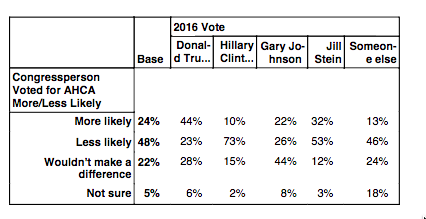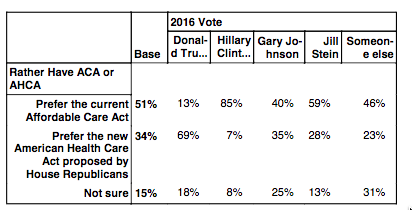Appropriate subdivisions
From Public Policy Polling on Twitter, a finding that voters are less likely to vote for a member of Congress if they supported the Republican anti-healthcare bill
The problem with this sort of claim, as we’ve seen for NZ examples in the past, is that more than 24% of voters already have ‘not in a million years’ as the baseline willingness-to-support for some candidates. Maybe this vote would just change that to `not in two million years’.
Since Public Policy Polling are a reputable survey company (even though I’m not a fan) , they publish detailed survey results (PDF). In these results, they break down the healthcare question by self-reported vote in the 2016 election

And, as you’d expect, the detailed story is different. People who voted for Clinton think the Republican healthcare bill is terrible; people who voted for Trump think it’s basically ok. The net 24% who might change their vote might be better described a mixture of a net 50% imaginary `loss’ of people who already weren’t voting Republican, and a net 20% imaginary `gain’ of people who already were.
What’s more striking than the 24% vs 48% overall percentage is that as many as 23% of Trump voters are willing to say something negative about the bill. Still, as an indication that even the hopeful news is unclear, consider this table

Only 13% of Trump voters prefer the current healthcare law, so the 23% who would penalise a Congressperson who voted for the new law includes at least 10% who actually prefer the new law or who aren’t sure.
Thomas Lumley (@tslumley) is Professor of Biostatistics at the University of Auckland. His research interests include semiparametric models, survey sampling, statistical computing, foundations of statistics, and whatever methodological problems his medical collaborators come up with. He also blogs at Biased and Inefficient See all posts by Thomas Lumley »
